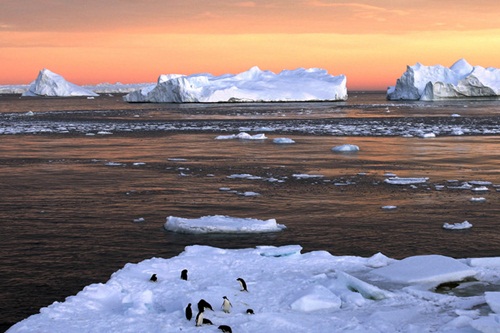The Intergovernmental Panel on Climate Change (IPCC), an international consortium of multiple climate researchers, convened by the United Nations, has issued a serious warning that if the world fails to act swiftly to get rising temperatures under control in 10 years, it would be catastrophical for life on earth.
Highlighting the urgency to reach the targets mentioned in the Paris agreement quicker than planned, the landmark report by the IPCC has delivered a dramatic and extraordinarily serious warning: “Act swiftly, get global warming under control within the next ten years or the world watch the world go down.”
Under the Paris Agreement, the participant countries had signed a deal to keep global temperatures between 1.5°C and 2°C.
However, the latest report, one of the most important reports produced by the IPCC, suggests that instead of reducing global emissions and bringing down global warming, human activities have actually caused about 1°C of global warming, according to the report.
The aftermaths of global warming are increased temperature, rising sea levels, coral bleaching, and shrinking of the Arctic sea ice. In order to limit the warming to 1.5C, the global emissions need to be cut by 45 per cent by 2030 compared with 2010 levels.
Limiting global warming to 1.5°C will require “far-reaching and unprecedented changes,” such as ditching coal for electricity to slash carbon emissions, the Intergovernmental Panel on Climate Change (IPCC) has said, launching a special report that finds some of the actions needed are already under way, but the world must move faster.
The IPCC, the United Nations top climate panel, issued the report from Incheon, Republic of Korea, where for the past week, hundreds of scientists and government representatives have been pouring over thousands of inputs to paint a picture of what could happen to the planet and its inhabitants with global warming of 1.5°C (or 2.7 degrees Fahrenheit).
“One of the key messages that comes out very strongly from this report is that we are already seeing the consequences of 1°C of global warming through more extreme weather, rising sea levels and diminishing Arctic sea ice, among other changes,” said Panmao Zhai, co-chair of one of the IPCC Working Groups.
The landmark Paris Agreement adopted in December 2015 by 195 nations at the 21st Conference of the Parties to the UN Framework Convention on Climate Change (UNFCCC) included the aim of strengthening the global response to the threat of climate change by “holding the increase in the global average temperature to well below 2°C above preindustrial levels and pursuing efforts to limit the temperature increase to 1.5°C above pre-industrial levels.”
Tweeting shortly after the report was launched UN Secretary-General António Guterres said that it is not impossible to limit global warming to 1.5°C, according to the report. But it will require unprecedented and collective climate action in all areas. There is no time to waste.
The report highlights a number of climate change impacts that could be avoided by limiting global warming to 1.5°C compared to 2°C, or more.
For instance, by 2100, global sea level rise would be 10 cm lower with global warming of 1.5°C compared with 2°C.
The likelihood of an Arctic Ocean free of sea ice in summer would be once per century with global warming of 1.5°C, compared with at least once per decade with 2°C.
Moreover, coral reefs, already threatened, would decline by 70-90 per cent with global warming of 1.5°C, whereas virtually all (> 99 per cent) would be lost with 2°C, according to the report.
“Every extra bit of warming matters, especially since warming of 1.5°C or higher increases the risk associated with long-lasting or irreversible changes, such as the loss of some ecosystems,” said Hans-Otto Pörtner, Co-Chair of IPCC Working Group II.
‘Possible with the laws of chemistry and physics,’ but we need to move faster “Limiting warming to 1.5°C is possible within the laws of chemistry and physics but doing so would require unprecedented changes,” said Jim Skea, co-chair of IPCC Working Group III.
With that in mind, the report calls for huge changes would in land, energy, industry, buildings, transportation and cities. Global net emissions of carbon dioxide would need to fall by 45 per cent from 2010 levels by 2030 and reach "net zero" around 2050.
Allowing the global temperature to temporarily exceed or ‘overshoot’ 1.5ºC would mean a greater reliance on techniques that remove CO2 from the air to return global temperature to below 1.5°C by 2100.
But the report warns that “the effectiveness of such techniques are unproven at large scale and some may carry significant risks for sustainable development.”
“Limiting global warming to 1.5°C compared with 2°C would reduce challenging impacts on ecosystems, human health and well-being, making it easier to achieve the United Nations Sustainable Development Goals (SDGs),” said Priyardarshi Shukla, co-chair of IPCC Working Group III, referring to the 17 Goals adopted by UN member states three years ago to protect the planet and ensure that all people enjoy peace and prosperity by 2030.
The new report will feed into a process called the ‘Talanoa Dialogue,’ in which parties to the Paris accord will take stock of what has been accomplished over the past three years. The dialogue will be a part of the next UNFCCC Conference of States parties, known by the shorthand COP 24, which will meet in Katowice, Poland, this December.



















